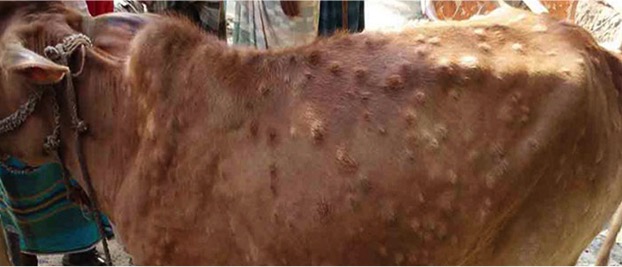LUMPY Skin Disease (LSD) is an infectious viral disease of the cattle and bovine animals. It is fast spreading in some districts of Vidarbha and Marathwada, creating panic among dairy farmers. The state Animal Husbandry department, so far confirmed 93,252 cases of the Capripox virus infections in the state. It was first detected in the state in Gadchiroli district in April and have been recorded in the state.
The virus causes the development of stiff, round, cutaneous nodules of 2-5 cm in diameter on the skin of animal. Besides this it causes fever, lesions in the mouth and reduced milk production. The virus strain currently active is said to have about 20 percent morbidity and about 1 percent mortality rate. Maharashtra state has launched a vaccination programme.
Buffaloes are getting less affected than the cows
The virus is not zoonotic and doesn’t infect humans through consumption of milk or meat. Though it affects the cow and buffalo, however, infection in the latter has been found to be minimal.
As per the state Animal Husbandry department, Chandrapur is the worst affected with 50,419 cases. It is followed by Nagpur with 12,296 cases so far. Other affected districts in Vidarbha are Gondia (8,150), Vardha (3,598) and Gadchiroli (1,358). In Marathwada, the disease has been detected in Nanded (13,136) and Parbhani (2,182) . It is in considerable proportion with a sporadic spread in several other districts.
Of the 93,252 animals infected so far since April, 67,035 have recovered following medical intervention.
Massive Vaccination Program
Dr Devendra Jadhav, deputy commissioner of Animal Husbandry (Disease Control), said the department has launched a massive vaccination programme . So far 1.52 lakh animals were inoculated with Goat Pox vaccine.
“Soon after the detection in Chandrapur, we had started a vaccination programme in Chandrapur, Gadchiroli and Nagpur. We have 4.5 lakh vaccination doses available with us. Whenever an infection is detected, we are sending the vaccine to inoculate the healthy animals to contain the spread,”.
“Since the virus spread via insects, it’s very important that the sheds are kept insect-free. The animals can be massaged with insect repellents. Apart from this, affected animals have to be kept away from healthy ones and should not be taken away for grazing. Also, once an infected animal is found, cattle in a five-km radius should be inspected and inoculated,” said Jadhav.
The outbreak detected outside Maharashtra also
The latest outbreak of the disease was detected in Mayurbhanj and Bhadrak in Odisha in November 2019. In January this year, cases were reported from Alappuzha, Kollam and Pathanamthitta districts of Kerala.
A large number of cattle in several parts of Chittoor district have contracted the ‘lumpy skin disease’. This is causing concern among the dairy farmers.
The officials say that the infection has spread into the district from the neighboring districts of Tamil Nadu. It happened through migration of cattle and their disposal at cattle fairs.
An estimated 500 cattle from the western mandals like Somala, Sadum, Pakala and Pulicharla have been affected by the disease. Which is causing high fever in the animals, along with drop in the milk production.
Dairy farmers say that the cattle are developing rashes, lumps in their udder and neck and high fever. The incidence of the disease has also been reported in some eastern mandals too.
Mosquitos also play vectors
Animal Husbandry Joint Director S. Venkatrao said the disease should be treated with care and the field staff are on the job to educate the farmers on this. “This disease has come to Chittoor from Tamil Nadu. Mosquitoes play vectors for the disease. The infected cattle develop high fever and fatigue. To prevent its spread, cattle sheds should be protected from mosquitoes. Though the mortality rate is rare, neglect may lead to complications,” he said.
Allaying the fears that the disease might spread to humans, the Joint Director said no scientific evidence supports to such claims. He said the dairy farmers should contact the field staff of the Animal Husbandry Department and seek advice. “We are planning awareness camps in the affected mandals,” said Mr. Venkatrao.
As reported in The Indian Express and The Hindu



























